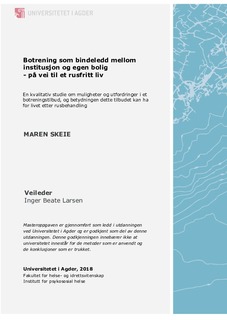Botrening som bindeledd mellom institusjon og egen bolig - på vei til et rusfritt liv : En kvalitativ studie om muligheter og utfordringer i et botreningstilbud, og betydningen dette tilbudet kan ha for livet etter rusbehandling
Master thesis
Permanent lenke
http://hdl.handle.net/11250/2564057Utgivelsesdato
2018Metadata
Vis full innførselSamlinger
Sammendrag
Background: The transition from inpatient treatment to own accommodation, the so-called “backsliding zone”, should according to research and experience happen as a gradual process where each individual gets more increasing responsibility. In Tyrili the students are offered life skills training as a part of the course of the drug treatment. This offer contributes to strengthen each individual’s ability to master his or her own living- and life situation. The background of this study was to gain knowledge of how life skills training can contribute to a good transition for life after treatment.
Problem statement and motivation: The study presents possibilities and challenges in life skills training for drug addicts as a part of the course of treatment. The thesis highlights the importance of the offer based on the contestant’s own experiences. The motivation has been to gain knowledge of the critical phase of ending their treatment, and what makes a successful transition possible. The study can contribute to highlighting life skills training as an integrated part of the course of treatment.
Selection and method: The selection consists of four students from the Tyrili Foundation who all have experience with life skills training as a part of drug treatment. The method is a qualitative research interview inspired by Giorgi’s phenomenological analysis.
Results: The life skills training service in Tyrili represents several possibilities and challenges. In life skills training the students are given the opportunity to live a life as equal as possible to the one they will be living after treatment. They get training in keeping structure, without the community framework of an institution. The students are also challenged to live in an environment where they are surrounded by drugs, without reacting by getting high. As it appears life skills training illustrates an important link between institution and own accommodation, and symbolizes hope for life after treatment.
Conclusion: The study shows that life skills training represents an important component in an integral drug treatment program. With community as a framework, individual needs are also in focus to strengthen each individual’s coping skills to face a drug free life. The study reveals the importance of the life skills training service; a place of possibility with belief in change, despite of everyday challenges. The study suggests life skills training to being essential to a successful treatment.
Keywords: Drug treatment, life skills training, transition, accommodation, work/activity, relapse, empowerment
Beskrivelse
Masteroppgave psykisk helsearbeid ME504 - Universitetet i Agder 2018

